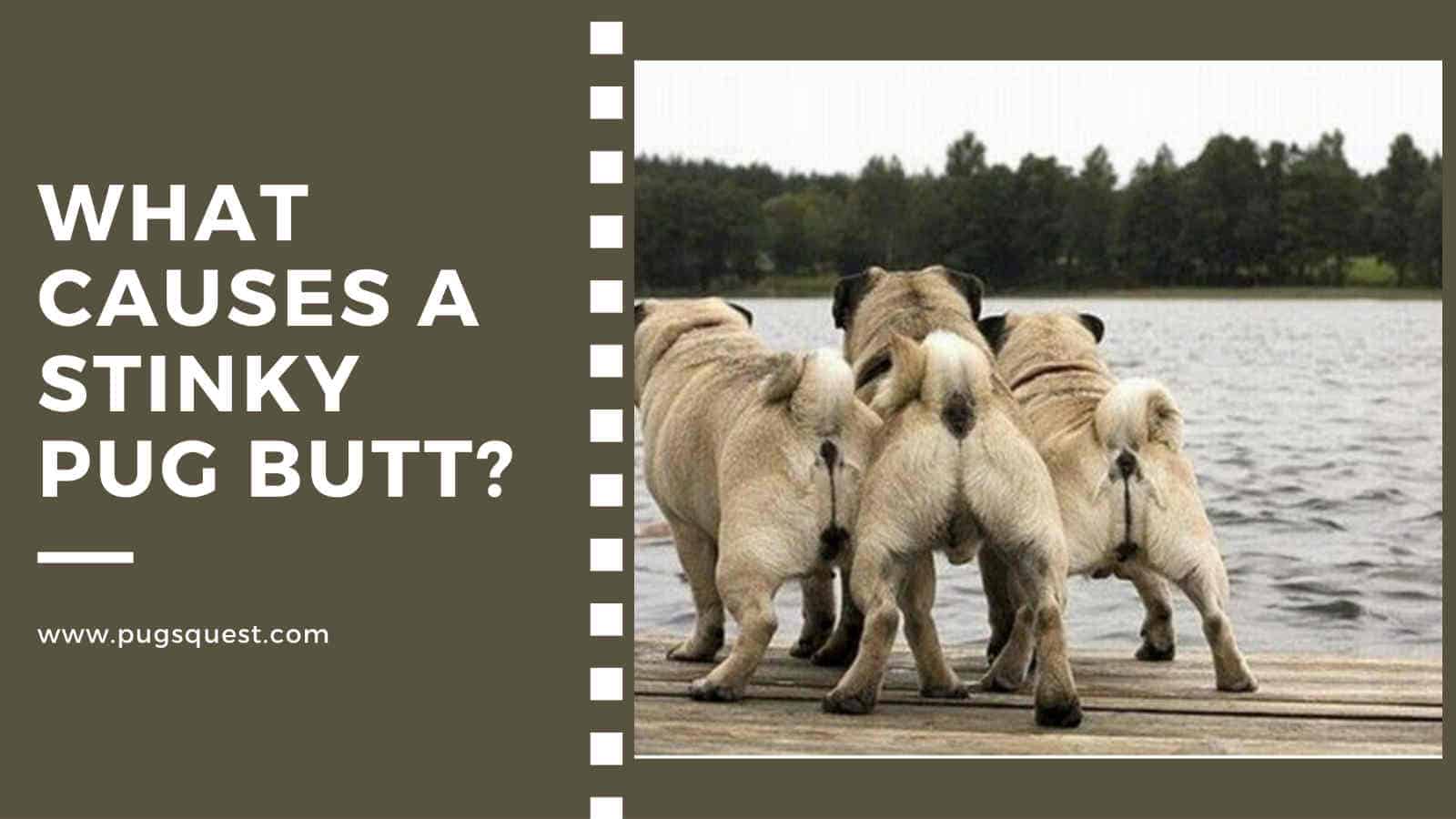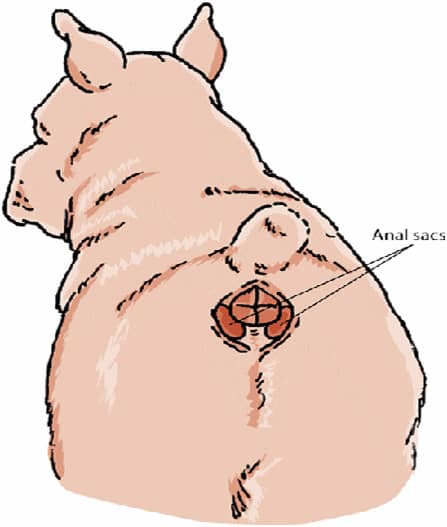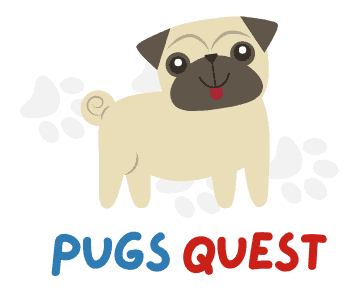
If you answered yes, it’s likely that your Pug’s anal gland could be to blame.
Nobody likes dealing with these ‘downstairs’ issues but it’s just a fact of life.
Sometimes your Pug will have a stinky butt and, as responsible pet owners, we’ve got to help them out – whether we like it or not.
If you’re not sure what to do about your pongy Pug’s bum, don’t you worry. Follow this guide and your pooch will surely smell like rainbows once again.
What Causes A Stinky Pug Butt?
If your Pug’s nether regions have been a bit pongy of late, there’s probably a good reason.
This is a very common phenomenon in Pugs, not least because their bums are always out.
Pugs often experience complications with their pooping and anal glands. And whilst this is very common, it should never go left untreated.
Most often than not, a stinky behind is the result of anal gland issues. So let’s start by discussing everything you need to know about this (not so glamorous) body part.
What Are Anal Glands?

Most often people describe the position of anal glands on a clock. They are positioned between layers of muscle near the anal opening. There should be one gland at approximately 4 o’clock and another at 8 o’clock.
Anal glands are internal and cannot be viewed easily. But why do they smell?
Well, when these glands fill up with liquid they produce a terrible pong. Many Pug owners describe this smell as something akin to fish – or even skunk.
In other words, it smells seriously yuck!
Normally dogs secrete this liquid when they poop. That’s how they spread their scent and mark their territory. It helps other dogs identify them – a bit like their own personal ID card.
But that’s not the only reason your Pug might be secreting foul odors.
Other reasons include:
- Your Pug is excited – happy or scared
- Genetic cause – sacs do not empty properly
- Poor bowel movements and digestive health
When Do Pug’s Anal Glands Become An Issue?
Pugs are renowned for developing problems with their anal glands. When these sacs become swollen, blocked, or enlarged it can be very uncomfortable for your pet.
When things are working normally, stool (or poop) passes over the glands.
But sometimes things go wrong.
Puppies, senior Pugs, and overweight Pugs are particularly susceptible to developing anal gland issues.
Sometimes a weak sphincter muscle may lead to anal leakage – if you’ve noticed a brown watery liquid on your cream carpet that’s probably the culprit.
In more serious cases, fecal impaction or an abscess may form as pus builds up in the anal sacs. This can be very painful and will eventually lead to severe swelling and rupture.
If you suspect either fecal impaction or abscess then we recommend visiting your vet immediately for treatment to alleviate your Pet’s discomfort and pain.
Anal Gland Problems: Symptoms To Look Out For
Anal gland problems are extremely unpleasant for your pooch (and your nose). For that reason, it’s super important to monitor your dog’s health regularly. By knowing what signs to look out for, you’ll be able to nip any emerging problems in the bud.
Symptoms of anal gland issues include:
- Scooting and bum dragging
- Excessive licking of the backside
- Sudden, powerful odors
- Leaking anal gland fluid (a watery brown substance)
- Swelling in the anal region
- Bleeding from the anus
- Difficulty pooping
- Discomfort while walking
Why Do Things Go Wrong? What Causes Anal Gland Issues?
Anal glands can become impacted, infected, or abscessed for a number of reasons. Sometimes a Pug might develop an inability to empty its anal glands naturally.
Here are some of the reasons why:
- Gastrointestinal problems – if your Pug is not producing healthy stools
- Allergies such as Atopy – atopic dermatitis can affect the perianal region
- Anal duct deformity – makes it difficult for glands to empty naturally
Other possible causes include abnormal secretion, various infections, and even cancer. If you are in any doubt about your Pug’s health, it’s important to visit your vet for a checkup.
Do You Need To Express Your Pug’s Anal Glands?
Every dog is different. Some may never require this procedure. Others will need their glands expressed every few weeks or so if it becomes an issue.
Most Pugs will release the fluid from their anal glands whilst pooping without much trouble.
But when these anal sacs fail to express themselves the natural way we humans sometimes have to step in. This may not be the most glamorous job in the world, but it’s very important.
If these fluid-filled glands aren’t expressed at some point, it can lead to infection. In more serious cases, an abscess may form that will require surgical removal by a veterinarian. To avoid this, it’s better to get your Pug’s anal glands expressed before it’s too late.
That’s why it’s so important to look out for those signs and symptoms we just discussed – how to spot the problem early and avoid infection.
How To Care For Your Pug’s Butt From Home
As with most things in life, prevention is better than cure. As a Pug owner, the best thing you can do to avoid chronic gland infections is to maintain your pup’s general health.
And for this particular issue, focussing on digestion is key.
Nutrition
If your Pug’s poop is less than perfect, it’s more than likely the result of dietary imbalance. Some dogs will need to be on a high-fiber diet to avoid impaction. Asking your vet for a Pug nutrition plan is a great way to maintain their gastrointestinal health.
In most cases switching to a higher quality dog food is enough to improve your Pug’s stools. You could also ask your vet to recommend some dietary supplements specifically designed to promote anal gland health and digestion.
Top-tip: Limit the amount of human food you feed your Pug. As much as they might love those leftovers, they are sometimes the culprit (causing soft stools).
Express Your Pug’s Anal Glands Yourself
Some brave pet owners decide to express their Pug’s glands from home. Whilst we would always recommend taking your Pug to the vet for this procedure, a Pug that requires very regular expression might be more comfortable staying at home.
If you want to express your Pug’s anal glands yourself, it’s important to familiarise yourself with the following steps.
You will need:
- Latex glove
- Wet paper towel
- Outside space (or a bathtub)
What you need to do:
- Take your Pug outside (or place them in the bathtub)
- Wearing a latex glove, locate your Pug’s anal sacs (remember they are at four ‘clock and eight o’clock position)
- Push your fingers in from of the sacs and gently squeeze them outwards (you should see fluid secreting from your Pug’s behind)
- Wipe down your Pug with a washcloth
- Wash your hands thoroughly
This is not a pleasant procedure for your Pug so remember to reward them with a favorite treat afterward.
Check out this video for a closer look at the procedure.
Wave Goodbye To Stinky Pug Butts
Your Pug’s anal glands could be the cause of that wretched stench. Pug’s anal glands can sometimes get clogged with fluid causing nasty odors and discomfort for your pet.
To treat this your Pug might require their anal sacs to be expressed. You can do this at home, but we recommend taking your pooch to the vet.
The best thing you can do from home is to prevent this from happening in the first place by observing proper nutrition for your Pug.
Images from Pinterest & merckvetmanual.com
